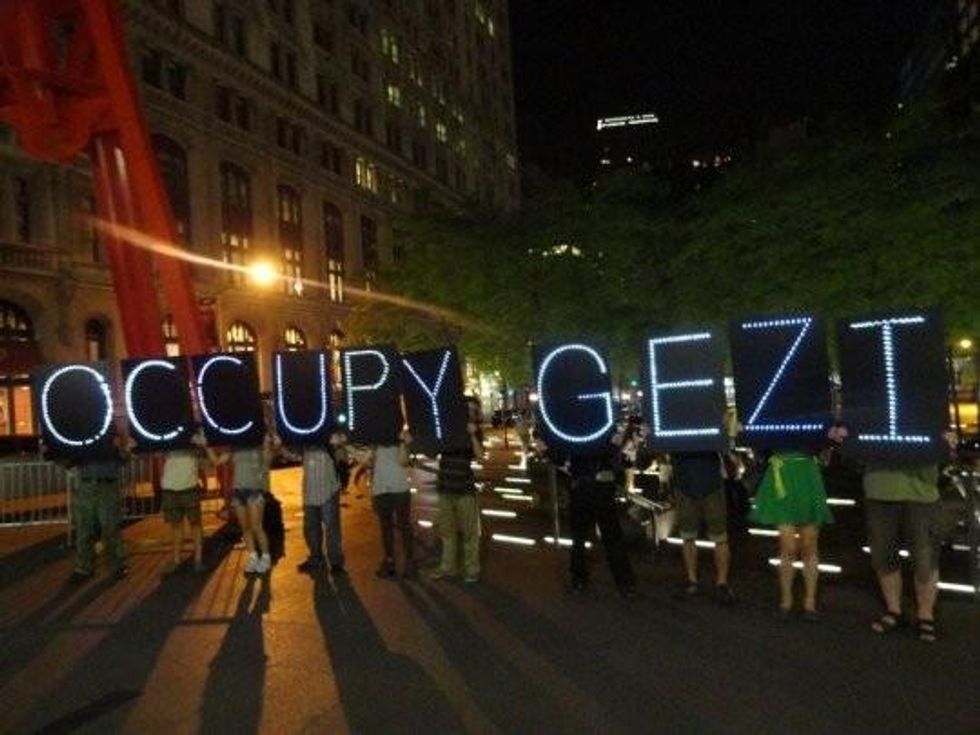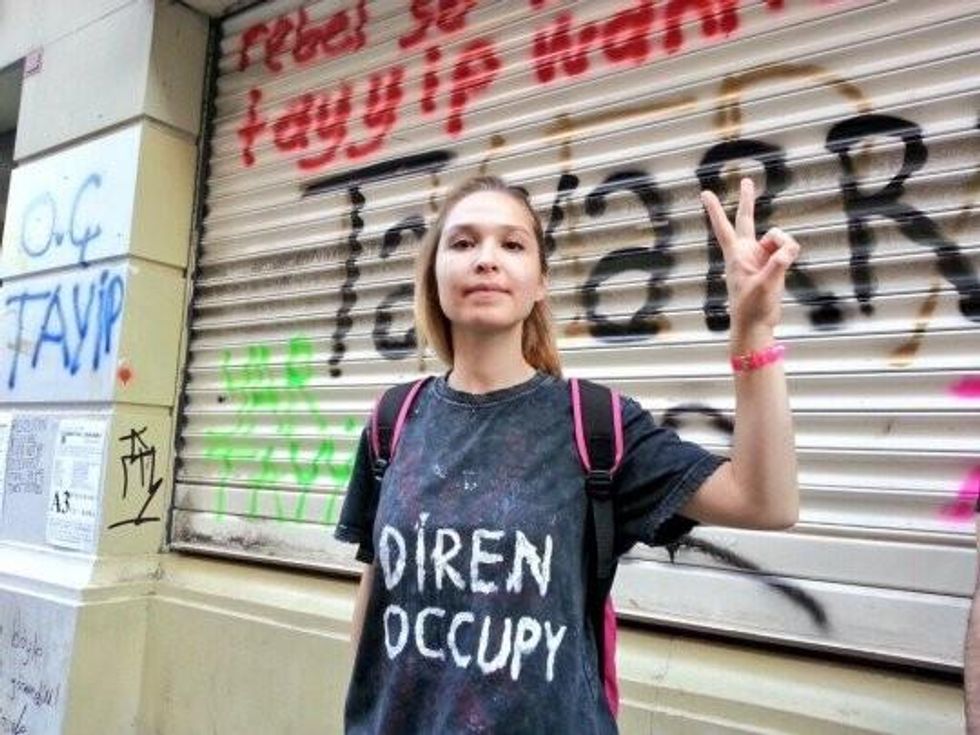

SUBSCRIBE TO OUR FREE NEWSLETTER
Daily news & progressive opinion—funded by the people, not the corporations—delivered straight to your inbox.
5
#000000
#FFFFFF
To donate by check, phone, or other method, see our More Ways to Give page.


Daily news & progressive opinion—funded by the people, not the corporations—delivered straight to your inbox.

"We have had enough of the way [Prime Minister Recep Tayyip] Erdogan understands democracy and the way he wants to dictate his rules," Ozgur Aksoy, an engineer demonstrating in Gezi Park on Monday, told Agence France-Presse.
"It's not only about the park here, it is about everything else in the last 10 years. People are angry, very angry."
Justin Wedes, one of the original organizers of Occupy Wall Street and who is in Turkey now, describes how the protest that started out to save a public park quickly morphed into something much bigger:
The protest began to save the park, but it quickly escalated into a full-out popular referendum on the legitimacy of the Erdogan administration, a religiously conservative and increasingly autocratic government. While broadly popular for its economic gains, the government has been increasingly scrutinized by groups that see it infringing more and more on people's secular rights: a recent decree banned drinking in public places after 10 p.m., and women's rights have been curtailed. At the same time, Erdogan has been pushing forward a very ambitious urban gentrification program, and Gezi Park -- the "life center" of Istanbul according to a cafe owner I met here yesterday -- was the last straw, for many people, in the over-development program. As in many cities around the world, over-gentrification leads to a squeezing of the working class and higher and higher pressure for job growth and salary increases, which aren't keeping pace.
Now, the demands of the protesters have broadened with their numbers, and they're calling for Erdogan's resignation. They're also calling for a more democratic government, a fairer media, and a whole host of other environmental and social demands. The protests are incredibly non-partisan, with youth in Gezi requiring people to put their political party flags away when entering the park. The only flags that remain are the Turkish ones, and many calls for "one united Turkey."
Erdogan has brushed off calls that the protests marked the start of a "Turkish Spring," and called social media, which helped mobilize thousands of poeple to "resist for their future," the real threat society faces.
"There is now a menace which is called Twitter," Erdogan said. "The best examples of lies can be found there. To me, social media is the worst menace to society."
Speaking on Democracy Now! on Monday, Koray Caliskan, assistant professor of political science at a university in Istanbul, described the protests' growth and the heavy use of tear gas by the police:
Three days ago, 700 people gathered to protest this, and police gassed them. Next day, 7,000 people gathered in the same square, and the police gassed them. And on Saturday, 700,000 people came together, and then the police fled.
Tweets about "#occupygezi lang:en"
On Monday, Turkey's Confederation of Public Workers' Unions (KESK), which has nearly a quarter million members across 11 unions, announced that it will hold a two-day strike starting Tuesday to protest what it desribes as "the state terror implemented against entirely peaceful protests" that "threatens civilians' life safety." KESK said the brutal crackdown by police showed the world the government's "enmity to democracy."
Watch a live stream here:
The Guardian has video of protests on Sunday evening showing police firing tear gas at demonstrators:

_______________________
Dear Common Dreams reader, The U.S. is on a fast track to authoritarianism like nothing I've ever seen. Meanwhile, corporate news outlets are utterly capitulating to Trump, twisting their coverage to avoid drawing his ire while lining up to stuff cash in his pockets. That's why I believe that Common Dreams is doing the best and most consequential reporting that we've ever done. Our small but mighty team is a progressive reporting powerhouse, covering the news every day that the corporate media never will. Our mission has always been simple: To inform. To inspire. And to ignite change for the common good. Now here's the key piece that I want all our readers to understand: None of this would be possible without your financial support. That's not just some fundraising cliche. It's the absolute and literal truth. We don't accept corporate advertising and never will. We don't have a paywall because we don't think people should be blocked from critical news based on their ability to pay. Everything we do is funded by the donations of readers like you. Will you donate now to help power the nonprofit, independent reporting of Common Dreams? Thank you for being a vital member of our community. Together, we can keep independent journalism alive when it’s needed most. - Craig Brown, Co-founder |

"We have had enough of the way [Prime Minister Recep Tayyip] Erdogan understands democracy and the way he wants to dictate his rules," Ozgur Aksoy, an engineer demonstrating in Gezi Park on Monday, told Agence France-Presse.
"It's not only about the park here, it is about everything else in the last 10 years. People are angry, very angry."
Justin Wedes, one of the original organizers of Occupy Wall Street and who is in Turkey now, describes how the protest that started out to save a public park quickly morphed into something much bigger:
The protest began to save the park, but it quickly escalated into a full-out popular referendum on the legitimacy of the Erdogan administration, a religiously conservative and increasingly autocratic government. While broadly popular for its economic gains, the government has been increasingly scrutinized by groups that see it infringing more and more on people's secular rights: a recent decree banned drinking in public places after 10 p.m., and women's rights have been curtailed. At the same time, Erdogan has been pushing forward a very ambitious urban gentrification program, and Gezi Park -- the "life center" of Istanbul according to a cafe owner I met here yesterday -- was the last straw, for many people, in the over-development program. As in many cities around the world, over-gentrification leads to a squeezing of the working class and higher and higher pressure for job growth and salary increases, which aren't keeping pace.
Now, the demands of the protesters have broadened with their numbers, and they're calling for Erdogan's resignation. They're also calling for a more democratic government, a fairer media, and a whole host of other environmental and social demands. The protests are incredibly non-partisan, with youth in Gezi requiring people to put their political party flags away when entering the park. The only flags that remain are the Turkish ones, and many calls for "one united Turkey."
Erdogan has brushed off calls that the protests marked the start of a "Turkish Spring," and called social media, which helped mobilize thousands of poeple to "resist for their future," the real threat society faces.
"There is now a menace which is called Twitter," Erdogan said. "The best examples of lies can be found there. To me, social media is the worst menace to society."
Speaking on Democracy Now! on Monday, Koray Caliskan, assistant professor of political science at a university in Istanbul, described the protests' growth and the heavy use of tear gas by the police:
Three days ago, 700 people gathered to protest this, and police gassed them. Next day, 7,000 people gathered in the same square, and the police gassed them. And on Saturday, 700,000 people came together, and then the police fled.
Tweets about "#occupygezi lang:en"
On Monday, Turkey's Confederation of Public Workers' Unions (KESK), which has nearly a quarter million members across 11 unions, announced that it will hold a two-day strike starting Tuesday to protest what it desribes as "the state terror implemented against entirely peaceful protests" that "threatens civilians' life safety." KESK said the brutal crackdown by police showed the world the government's "enmity to democracy."
Watch a live stream here:
The Guardian has video of protests on Sunday evening showing police firing tear gas at demonstrators:

_______________________

"We have had enough of the way [Prime Minister Recep Tayyip] Erdogan understands democracy and the way he wants to dictate his rules," Ozgur Aksoy, an engineer demonstrating in Gezi Park on Monday, told Agence France-Presse.
"It's not only about the park here, it is about everything else in the last 10 years. People are angry, very angry."
Justin Wedes, one of the original organizers of Occupy Wall Street and who is in Turkey now, describes how the protest that started out to save a public park quickly morphed into something much bigger:
The protest began to save the park, but it quickly escalated into a full-out popular referendum on the legitimacy of the Erdogan administration, a religiously conservative and increasingly autocratic government. While broadly popular for its economic gains, the government has been increasingly scrutinized by groups that see it infringing more and more on people's secular rights: a recent decree banned drinking in public places after 10 p.m., and women's rights have been curtailed. At the same time, Erdogan has been pushing forward a very ambitious urban gentrification program, and Gezi Park -- the "life center" of Istanbul according to a cafe owner I met here yesterday -- was the last straw, for many people, in the over-development program. As in many cities around the world, over-gentrification leads to a squeezing of the working class and higher and higher pressure for job growth and salary increases, which aren't keeping pace.
Now, the demands of the protesters have broadened with their numbers, and they're calling for Erdogan's resignation. They're also calling for a more democratic government, a fairer media, and a whole host of other environmental and social demands. The protests are incredibly non-partisan, with youth in Gezi requiring people to put their political party flags away when entering the park. The only flags that remain are the Turkish ones, and many calls for "one united Turkey."
Erdogan has brushed off calls that the protests marked the start of a "Turkish Spring," and called social media, which helped mobilize thousands of poeple to "resist for their future," the real threat society faces.
"There is now a menace which is called Twitter," Erdogan said. "The best examples of lies can be found there. To me, social media is the worst menace to society."
Speaking on Democracy Now! on Monday, Koray Caliskan, assistant professor of political science at a university in Istanbul, described the protests' growth and the heavy use of tear gas by the police:
Three days ago, 700 people gathered to protest this, and police gassed them. Next day, 7,000 people gathered in the same square, and the police gassed them. And on Saturday, 700,000 people came together, and then the police fled.
Tweets about "#occupygezi lang:en"
On Monday, Turkey's Confederation of Public Workers' Unions (KESK), which has nearly a quarter million members across 11 unions, announced that it will hold a two-day strike starting Tuesday to protest what it desribes as "the state terror implemented against entirely peaceful protests" that "threatens civilians' life safety." KESK said the brutal crackdown by police showed the world the government's "enmity to democracy."
Watch a live stream here:
The Guardian has video of protests on Sunday evening showing police firing tear gas at demonstrators:

_______________________